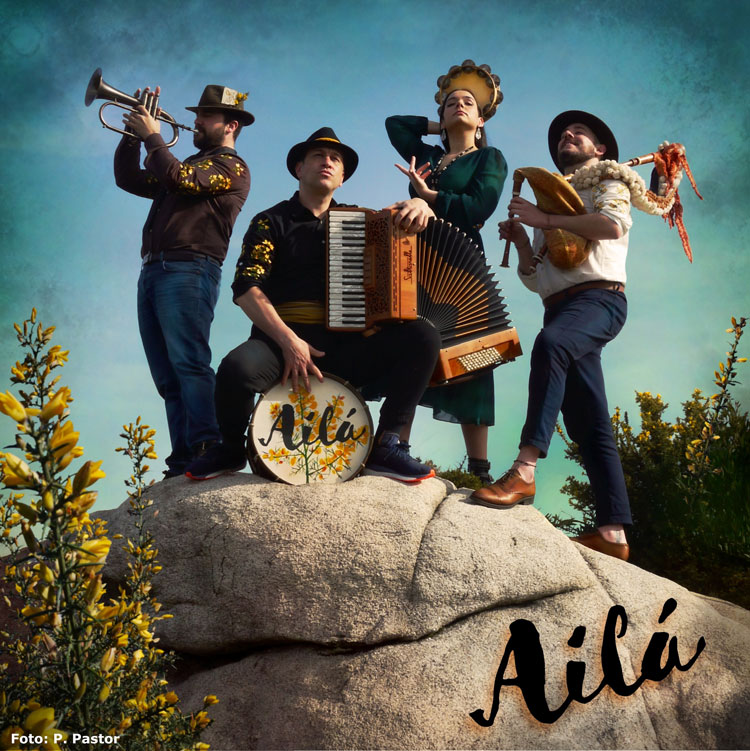Ailá – Ailá (Son Natural, 2022)
Folk music band Ailá emerged from the lively foliadas (Galician folk music celebrations and sessions) at Santiago de Compostela’s famed Casa das Crechas, an essential Galician folk music bar in northwestern Spain.
Ailá’s musical project is inspired by respect for tradition and Galician heritage music as well as a vision without borders, mixed with aromas, rhythms, and colors from other places and global cultures.
Furthermore, Ailá is one of the representatives of the new Galician Tradis Tribes, a genre that goes beyond music and in which dance and music become a way of understanding life, a way of being in the world.
The band’s debut album is the self-titled Ailá. The ensemble was developed at the small format music sessions, playing songs and tunes inspired by sound archives, traditional songbooks and old recordings. Over time, and based on this collective creation, a band was formed with the veteran accordionist and fireman Xan Pampín with extensive musical experience in groups such as Radio Cos and Banda das Crechas. Notably, he has the role of researcher and arranger of the material.
In terms of musical styles, Ailá plays lively jotas, muñeiras, waltzes and pasodobles inspired by the music of places as diverse as Laxoso (Ponte Caldelas), Santa Marina del Barro (A Baña), Abeneiros (Ordes), Coles (Ourense), San Martiño de Gallegos (Frades) and Los Seixedos (Covelo).
Ailá also want to bring back rare musical instruments such as the gaita rosca or simply rosca. Chiefly, the rosca is a shepherd’s bagpipe. Instead of using the familiar elder reed pipe, the rosca has a cow horn resonator at the lower end. Moreover, the quartet also uses the tarrañolas (a sort of castanet that consists of two independent tablets in hardwood, flat stone or tile), seashells and frying pans, thus offering a fascinating musical journey through Galician folk traditions.
Manuele Pardo is one of the vocalists. He also plays pipes and percussion. Pardo has extensive musical experience in groups such as Os da Porfía, Enxebres de San Lázaro, Arequinta de Xián, AC a Mámou de Luou. The other vocalist and percussionist is Ángela Carou, a young artist from Rianxo who has extensive training in A.C. Brincadeira, A.C.Fogo Fátuo and the Fonetix Vocal Group.
On trumpet and flugelhorn, Abel Gañete, who comes from another of the great traditions of Galicia, marching bands. As a musician he has performed with Teo’s Cultural Music Band, Marcos Pin’s Big Band and Pablo Castaño, Charanga TNT.
The band said: “Through Ailá we will take to the stage a repertoire of pieces that pays homage to the legacy of our mothers and grandmothers, to folk groups, to compilers who recovered part of our history.” The ensemble also incorporates the work of artisans, seamstresses, painters, “and the people who are part of that living ecosystem that we call tradition here.”
“We are aware that each generation wants to give a new twist to the musical tradition and revitalize it. We identify with the traditional. For us, it is much more than a label: it is a way of seeing and understanding life from a transversal perspective, in which music is the backbone of the community and a fundamental element to favor intergenerational relations”, explains Ailá.
The name of Ailá is an emotion made word. A neologism that refers to a semantic reduction of the popular song of joy and fun, ‘Ailalelo ailalá’, which is so widely used in traditional Galician folklore.
Musicians: Angela Carou on vocals and percussion; Manuele Pardo on vocals, percussion, and bagpipes; Abel Gañete on flugelhorn and trumpet; and Xan Pampín on accordion and bombo (bass drum).
Guests: Manuel Amigo on conchas (seashells) and tarrañolas; Pedro Lamas on gaita de rosca; Nikolai Velikov on violin; Pedro Pascual on mandolin and viola amarantina; Pablo Carpintero on vocals; Andrés Villán on caixa; Fernando Saá on lata (can) and tixola (frying pan); Andrea Pérez López on alto sax; Maria Prado López on trumpet; and Maritza Ruan López on trompa (French horn).


